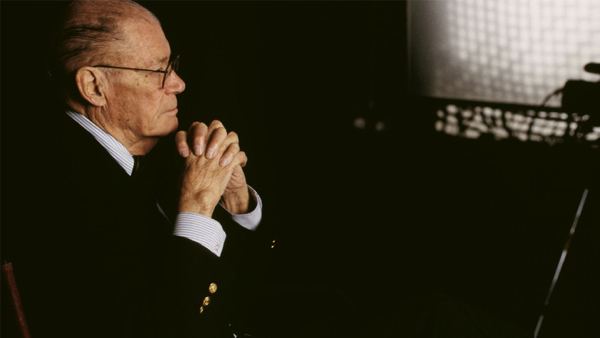Movie review by Greg Carlson
The newly minted Academy Award winner for Best Documentary Feature is Errol Morris’ “The Fog of War,” a thought-provoking character study of Robert S. McNamara, one of the best and brightest of his generation, and a figure who remains controversial to this day. Now well into his 80s, McNamara is remembered primarily as one of the chief architects of the Vietnam War, which he helped to orchestrate while serving as the Secretary of Defense. Morris spends plenty of time addressing McNamara’s decisions and mistakes while serving under Lyndon Johnson, but the far-reaching film also digs in to McNamara’s recollections of both World Wars (his earliest memories go all the way back to WW I), his tenure as president of the Ford Motor Company, and his relationship with JFK.
Eschewing any other talking heads in favor of solo, direct eye contact with McNamara (achieved via Morris’ Interrotron technique, which essentially involves the use of teleprompters reflecting video images of faces instead of text in order to create the illusion that the filmed subject is looking directly at you), Morris culled his impressively edited final cut from more than twenty hours of footage. McNamara is no stranger to media manipulation, and while the crafty elder statesman recounts horrifying descriptions of the Tokyo firebombing of WW II and the use of Agent Orange in Vietnam, he remains largely aloof, refusing at any point to apologize.
But then, what would be the point of an apology? McNamara, who chokes up several times in the course of the movie (when he describes the selection of Kennedy’s gravesite, for example), certainly reveals a sense of painful regret, particularly when he ruminates on “counterfactuals,” or the what-might-have-been scenarios preferable to the death and destruction resulting from combat. McNamara is always happy to scapegoat others, however, and hawkish General Curtis LeMay – who honestly does not require much assistance in being painted as a cold-hearted warmonger – takes the brunt of McNamara’s criticism in the recounting of WW II military strategy.
“The Fog of War” is a film that invites immediate comparison to the current military climate (although Morris had been planning the movie prior to the invasion of Iraq), but Morris covers plenty of other turf. Some of the most compelling moments deal with McNamara’s tenure as Ford Motor Co. chairman (the corporation’s first non-family member in that role, McNamara proudly notes). McNamara lays claim to the development of the seat belt, and the reenactment of Ford’s early, crude “safety tests” provides Morris with the golden opportunity to show slow motion shots of human skulls bouncing down stairwells. The images are simultaneously gruesome and hilarious.
Audiences unfamiliar with Morris might feel unsatisfied with the level of evasiveness the film’s subject is allowed (and clearly the film would have been much stronger had it included more details about McNamara’s personal life: the allusions to the sacrifices of his wife and children leave one hungry for more information). Morris, however, is a master provocateur, and relishes the nuances and ambiguities of complex questions. Along with the gripping interview material, “The Fog of War” contains a haunting score by Philip Glass, top-notch archival footage, and revealing declassified audio of Pentagon and White House conversations. So regardless of your take on McNamara’s relative level of truthfulness (or for that matter, Morris’ own agenda), “The Fog of War” is a worthwhile experience, and a must-see for 20th century history buffs.
